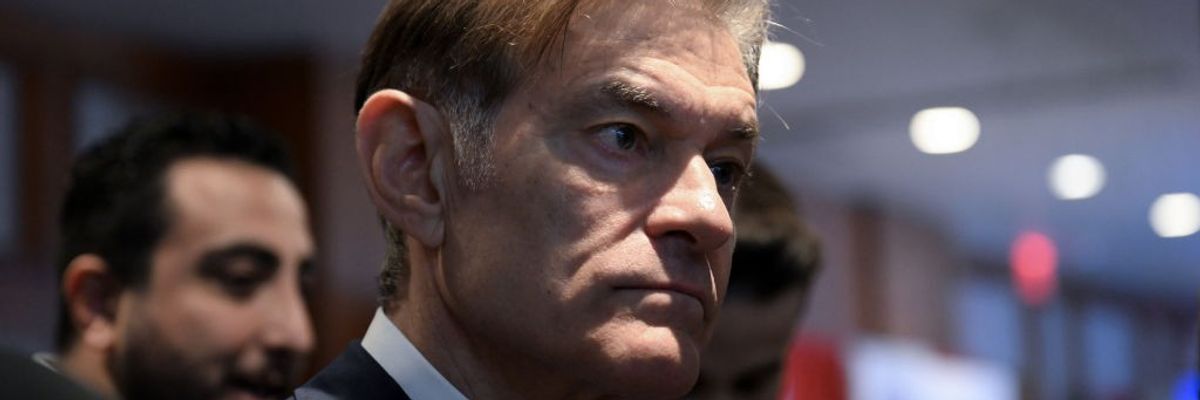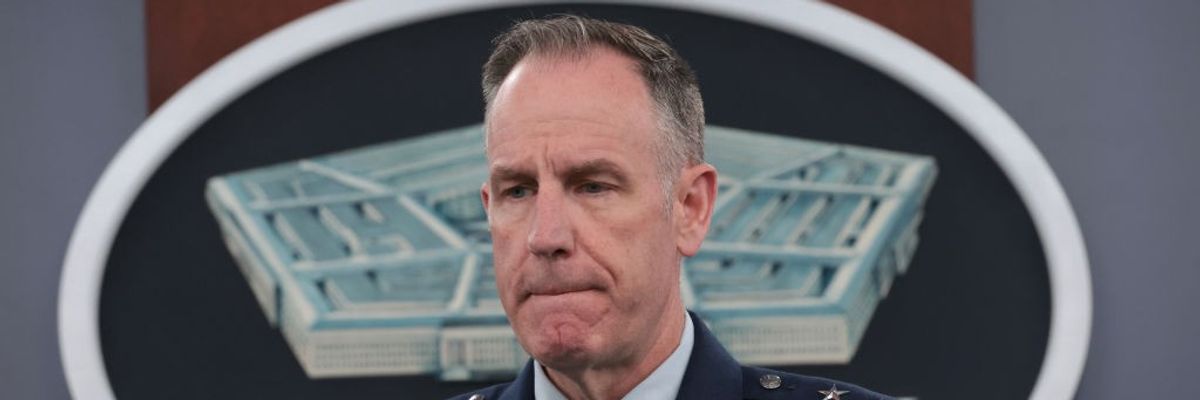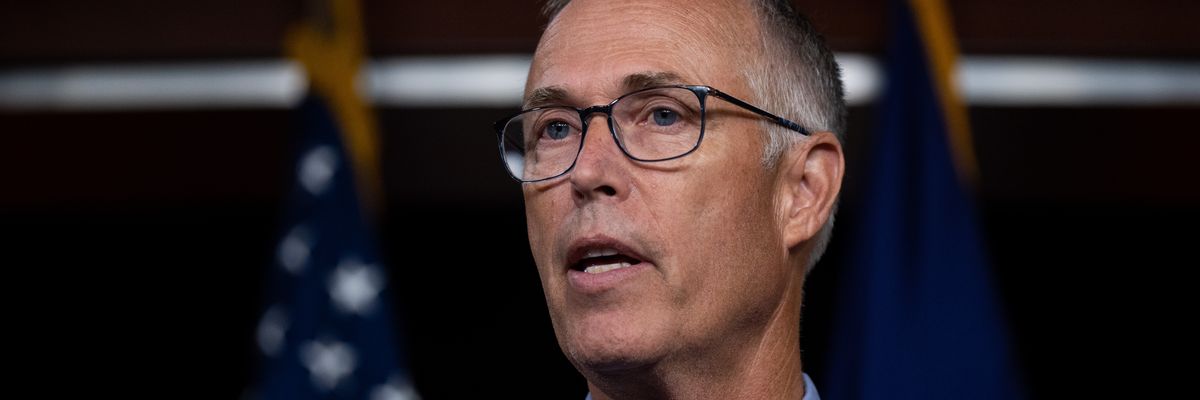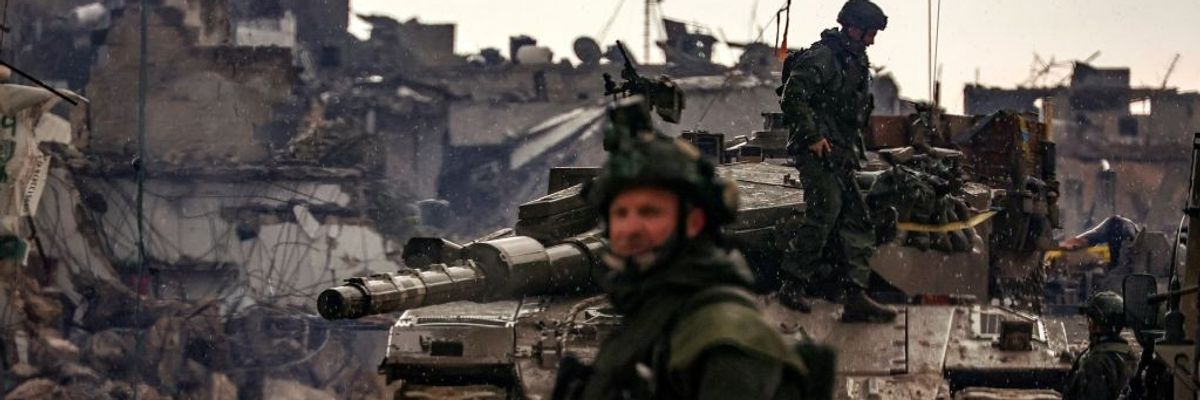Watchdog Says Dr. Oz Push for 'Medicare Advantage for All' Is Disqualifying
"Oz's deep ties to the private healthcare industry make his nomination to lead our nation's current healthcare system totally egregious," said Public Citizen healthcare advocate Eagan Kemp.

Dr. Mehmet Oz was pictured at an event in New York City on November 21, 2024.
(Photo: Fatih Aktas/Anadolu via Getty Images)
Jake Johnson
Dec 20, 2024
COMMON DREAMS
The watchdog group Public Citizen said Thursday that lawmakers should reject President-elect Donald Trump's nomination of Medicare privatization advocate Mehmet Oz to lead a key health agency and instead move toward a publicly run single-payer system that would cover all Americans at a lower cost than the status quo.
In a new brief, Public Citizen warned that Medicare privatization efforts—particularly via an expansion of Medicare Advantage plans run by for-profit insurance companies—would likely "move into overdrive" if the Senate confirms Oz as administrator of the Centers for Medicare and Medicaid Services (CMS).
Ahead of his 2022 Senate bid, Oz backed a plan he described as "Medicare Advantage for All," under which privately run plans would cover non-seniors and "all Americans who are not on Medicaid"—effectively eliminating traditional Medicare.
Public Citizen warned such a plan "would mean huge corporate profits while patients continue to struggle to get the healthcare they need," noting that Medicare Advantage plans are notorious for denying necessary care and overbilling the federal government to the tune of tens of billions of dollars per year.
"Policymakers should pass Medicare for All to guarantee care for everyone in the U.S., bring down costs for working families, and generate savings for the country as a whole."
"Further privatizing Medicare would increase healthcare costs systemwide by adding further administrative bloat to our healthcare system," the new brief argues. "Our healthcare system is already made up of thousands of health insurance plans offered by numerous insurers as well as state and federal programs that all play some role in paying for healthcare."
"By spending healthcare resources on corporate profit or administrative waste, privatized Medicare would mean Americans pay even more for healthcare than they already do," the brief adds. "We already spend far more than comparably wealthy countries, over $12,500 per capita, compared with peer nations that are spending around half, per capita."
Oz's plan would also benefit companies in which he has invested tens of millions of dollars, according to financial disclosures.
"Dr. Oz owned between $280,000 and $600,000 in shares in UnitedHealth Group, a major Medicare Advantage insurer, and between $50,000 and $100,000 in shares of CVS Health," Public Citizen noted Thursday, citing the filings.
Eagan Kemp, a healthcare advocate at Public Citizen, said in a statement that Oz's "Medicare Advantage for All" proposal "is dangerous to all patients, especially seniors and people with disabilities, many of whom have not received the care they need under Medicare Advantage."
"Healthcare is a right, not a commodity," said Kemp. "Oz's deep ties to the private healthcare industry make his nomination to lead our nation's current healthcare system totally egregious. Congress should reject Oz's nomination and any proposal to further privatize Medicare."
"Instead," he added, "policymakers should pass Medicare for All to guarantee care for everyone in the U.S., bring down costs for working families, and generate savings for the country as a whole."
Public Citizen's brief came as Oz's nomination faced increasingly close scrutiny from congressional Democrats, who have raised similar concerns about the former television personality's promotion of Medicare Advantage and ties to the private insurance industry.
"As CMS administrator, you would be tasked with overseeing Medicare and ensuring that the tens of millions of seniors that rely on the program receive the care they deserve, including cracking down on abuses by private insurers in Medicare Advantage," a group of Democratic lawmakers led by Sen. Elizabeth Warren (D-Mass.) wrote in a letter to Oz last week. "The consequences of failure on your part would be grave. Billions of federal healthcare dollars—and millions of lives—are at stake."
"Given your financial ties to private insurers, combined with your view that the traditional Medicare program is 'highly dysfunctional' and your advocacy for eliminating it entirely," the lawmakers added, "it is not clear that you are qualified for this critical job."
"Oz's deep ties to the private healthcare industry make his nomination to lead our nation's current healthcare system totally egregious," said Public Citizen healthcare advocate Eagan Kemp.

Dr. Mehmet Oz was pictured at an event in New York City on November 21, 2024.
(Photo: Fatih Aktas/Anadolu via Getty Images)
Jake Johnson
Dec 20, 2024
COMMON DREAMS
The watchdog group Public Citizen said Thursday that lawmakers should reject President-elect Donald Trump's nomination of Medicare privatization advocate Mehmet Oz to lead a key health agency and instead move toward a publicly run single-payer system that would cover all Americans at a lower cost than the status quo.
In a new brief, Public Citizen warned that Medicare privatization efforts—particularly via an expansion of Medicare Advantage plans run by for-profit insurance companies—would likely "move into overdrive" if the Senate confirms Oz as administrator of the Centers for Medicare and Medicaid Services (CMS).
Ahead of his 2022 Senate bid, Oz backed a plan he described as "Medicare Advantage for All," under which privately run plans would cover non-seniors and "all Americans who are not on Medicaid"—effectively eliminating traditional Medicare.
Public Citizen warned such a plan "would mean huge corporate profits while patients continue to struggle to get the healthcare they need," noting that Medicare Advantage plans are notorious for denying necessary care and overbilling the federal government to the tune of tens of billions of dollars per year.
"Policymakers should pass Medicare for All to guarantee care for everyone in the U.S., bring down costs for working families, and generate savings for the country as a whole."
"Further privatizing Medicare would increase healthcare costs systemwide by adding further administrative bloat to our healthcare system," the new brief argues. "Our healthcare system is already made up of thousands of health insurance plans offered by numerous insurers as well as state and federal programs that all play some role in paying for healthcare."
"By spending healthcare resources on corporate profit or administrative waste, privatized Medicare would mean Americans pay even more for healthcare than they already do," the brief adds. "We already spend far more than comparably wealthy countries, over $12,500 per capita, compared with peer nations that are spending around half, per capita."
Oz's plan would also benefit companies in which he has invested tens of millions of dollars, according to financial disclosures.
"Dr. Oz owned between $280,000 and $600,000 in shares in UnitedHealth Group, a major Medicare Advantage insurer, and between $50,000 and $100,000 in shares of CVS Health," Public Citizen noted Thursday, citing the filings.
Eagan Kemp, a healthcare advocate at Public Citizen, said in a statement that Oz's "Medicare Advantage for All" proposal "is dangerous to all patients, especially seniors and people with disabilities, many of whom have not received the care they need under Medicare Advantage."
"Healthcare is a right, not a commodity," said Kemp. "Oz's deep ties to the private healthcare industry make his nomination to lead our nation's current healthcare system totally egregious. Congress should reject Oz's nomination and any proposal to further privatize Medicare."
"Instead," he added, "policymakers should pass Medicare for All to guarantee care for everyone in the U.S., bring down costs for working families, and generate savings for the country as a whole."
Public Citizen's brief came as Oz's nomination faced increasingly close scrutiny from congressional Democrats, who have raised similar concerns about the former television personality's promotion of Medicare Advantage and ties to the private insurance industry.
"As CMS administrator, you would be tasked with overseeing Medicare and ensuring that the tens of millions of seniors that rely on the program receive the care they deserve, including cracking down on abuses by private insurers in Medicare Advantage," a group of Democratic lawmakers led by Sen. Elizabeth Warren (D-Mass.) wrote in a letter to Oz last week. "The consequences of failure on your part would be grave. Billions of federal healthcare dollars—and millions of lives—are at stake."
"Given your financial ties to private insurers, combined with your view that the traditional Medicare program is 'highly dysfunctional' and your advocacy for eliminating it entirely," the lawmakers added, "it is not clear that you are qualified for this critical job."











